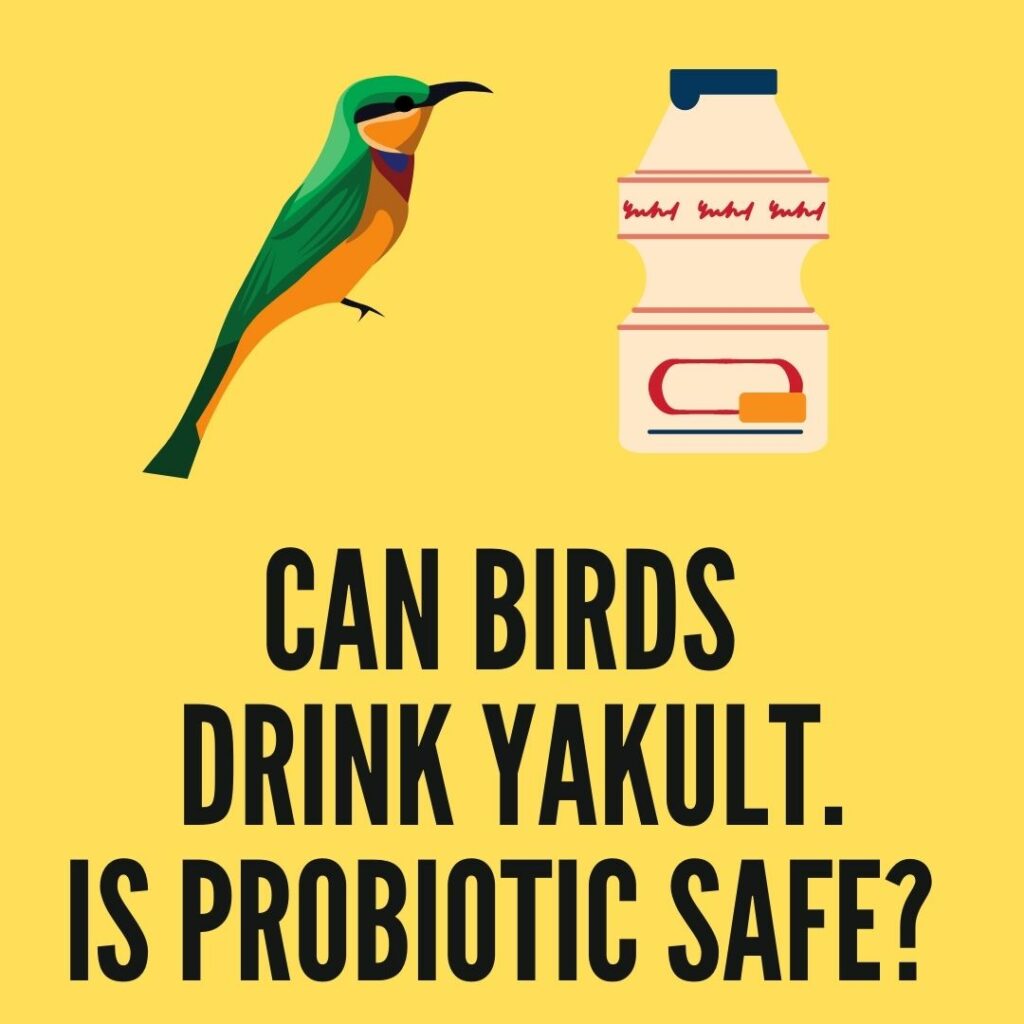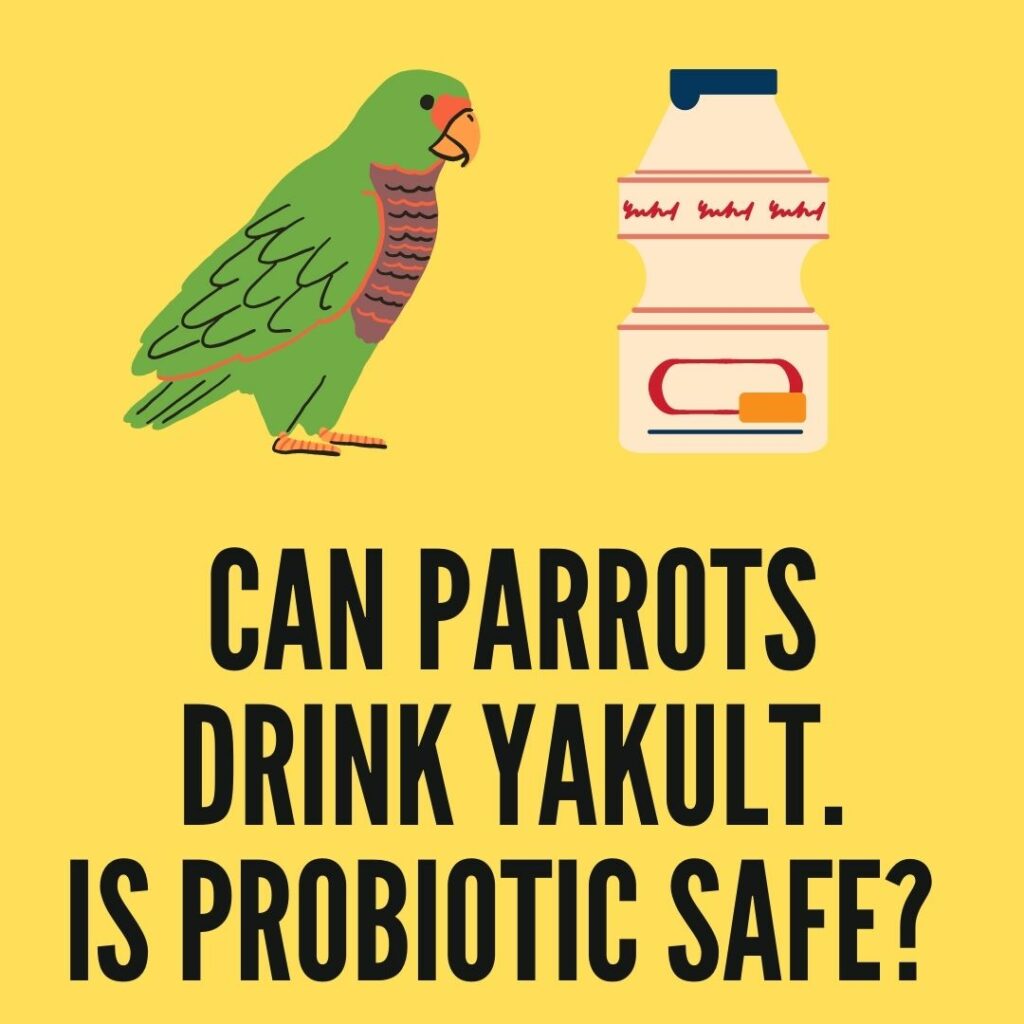
Is Yakult okay for birds? Are Probiotics Safe for birds? Lately, Probiotics have become quite common amongst the bird and poultry industry. They have been a popular choice amongst bird enthusiasts for the array of benefits these probiotic supplements provide.
It has even given way to probiotic manufacturers, and as a result, we now have an array of options in the market. However, regardless of how many bird-specific probiotics the market has, some bird owners still swear by Yakult.
But is Yakult a safe probiotic for Birds? Come Let’s find out:
Yakult is a fermented milk-based probiotic drink launched primarily for human consumption. It is known for improving digestion, gut health, and building immunity. Although Yakult was discovered keeping humans in mind, there are individuals who feed it to birds, cats, and dogs.
Is Yakult okay for birds? Is Yakult safe for pigeons?
As long as you are giving it in moderation, Yakult is safe for birds. It will provide them with a good amount of composing probiotic bacteria, bringing in good results. You may observe (or virtually not):
Yakult benefits for birds
- Improvement of nutrient absorption.
- Better weight management.
- Reduces chances of harmful bacteria formation.
- Improves plumage development
- Improves egg production and quality.
- Supports stress from environmental changes.
However, regardless of the benefits, Yakult also contains lactose and sugar contents which can prove harmful for birds.
Birds are highly lactose intolerant as they never evolved to produce lactase, which helps digest lactose-based products. Hence an overdose of lactose-carrying products can prove threatening for their health.
Also, even when birds rely on nectar drinking, giving them much sugar isn’t safe for their health. Thus, it is advisable to choose other bird probiotics over Yakult every time. However, if you do not have an option, be careful of the portion and frequency of Yakult for birds.
Remember, an overdose of the same can even kill them before you realize it. For pet birds whom you feed Yakult every day, you may notice detouring health. If yes, discontinue it quickly and reach a VET or a certified bird expert soon.

Are probiotics good for birds?
Probiotics are as beneficial for birds as they are for humans. These supplements help birds strengthen their natural defense system against all bacterial infections.
By becoming the normal bacterial flora, probiotics support the growth of other normal bacteria in birds.
The probiotics that are specifically designed for birds are called Avian probiotics.
4 Best Probiotics for birds
In giving birds their best possible nutrition, one of the steps is feeding them the best probiotics. And it can only happen when you switch from Yakult and other human probiotics to bird-specific probiotics.
Though if you think the process is a little tricky for you, we have some great recommendations. Have a look:
HealthyGut Avian Probiotics Dietary Supplement for Parrots
OASIS #80070 Alive and Well, Stress Preventative & Pro-Biotic Tablets for Birds
Morning Bird Probiotics, Bird Probiotic Formula
Nekton-Biotic-Bird Probiotics for Birds
Can you give Expired Yakult to birds?
No, if you are left with any expired Yakult, discard it.
Anything that is manufactured and has a ‘Shelf life’ must never be used once its expiry date has passed. After that, its taste, color, and nutritional value may change. They even may not carry full potency for improving ones’ gut health.
Giving an expired Yakult to birds might not kill them, but it can definitely make them sick. Thus, avoid doing it at any cost.
Can birds drink probiotic drinks?
For maintaining a healthy digestive and immune system, probiotic drinks can be fed daily to the birds. Depending upon the bird’s age and health, look up the number of probiotics you offer them.
A small and thin bird may have no more than 5 to 6 drops of probiotic as her daily dose. However, if the bird is well grown, you can increase the quantity with fewer drops.
It is important to maintain probiotic consumption in birds during,
- Environmental changes/ stress
- Temperature changes/ stress
- Transportation
- Food and Water changes
- Hatching

Can parrots drink Yakult every day?
Avoid feeding Yakult every day to parrots or any other bird for that matter. Overdoes and high consumption of this human-specific probiotic can lead to health detouring in them.
Thus, instead, go for bird-specific probiotics that are safe and healthier.
How do I give my chickens probiotics?
While probiotics are good for chicken and other poultry birds, giving them in moderation is the key.
One or a maximum of two tablespoons of probiotics a day is enough for maintaining good health in chickens. If the bird is small, lower the amount of supplement.
Also, you can either feed them probiotics standalone or mix them in their food or water. Do as and what your chickens like.
Before settling up for one, you can offer them probiotics from different brands to catch their favorite taste.
How much probiotics should I give my chickens?
Usually is it not advised to give poultry chickens dairy products, but still, to maintain optimal gut health these fermented drinks can be given in small amounts. One tablespoon or two Max daily per chicken will be fine.
Can you give Yakult to Hens/poulty Animals ? Can Chickens Drink Yakult?
Probiotics are extremely beneficial for chickens, but be cautious when dealing with human probiotics.
Chickens aren’t lactose intolerant, and thus they can digest Yakult and other lactose-based probiotics.
However, feed them in moderation as an overdose of Yakult and hamper their health, especially their digestive system. Hence instead of doing good, it can show some adverse effects.
Wrapping up….
Yakult is a lactose-based probiotic supplement, and living beings who aren’t lactose tolerant should avoid them. Especially when it is about birds, go with other bird-specific probiotics instead of Yakult and more human probiotics.
Also, never let your birds go under stress when harmful bacteria can take over their health.

Hi, There and Welcome to BirdsNews.com, is here to help you learn and care about pet birds. and this blog is a journal of everything I’ve learned.

